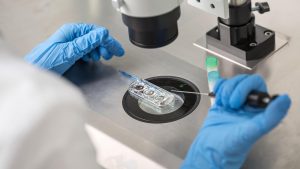A new study presented at the European Association of Urology Congress in Barcelona has revealed that sperm taken from the testes of infertile men are just as successful at achieving a healthy pregnancy as the sperm from fertile men.
Historically, infertility has been associated as the fault of the female, something that we now know is definitely not the case. Back in 2017, a landmark study looking at the sperm concentration of western men revealed that disturbingly, the average sperm count had dropped by 50% since 1973.
In order to understand why this was happening, there have been numerous studies designed to help improve our knowledge and understanding of male infertility.
Experts have previously revealed that in all infertility cases, anywhere between 40-50% of the underlying causes is attributed to “male factor” meaning it could be a reduced sperm count, lowered sperm morphology or even poor sperm motility.
This new study has delved deeper into male infertility and suggested that part of the issue could lie within the sperm’s journey from the testicles towards ejaculation.
When scientists looked at the DNA damage in both fertile and infertile men, when it came to ejaculated sperm, the damage was almost twice as high in the infertile group. When they examined the testicular sperm in the same two groups, they found that all of the sperm cells retrieved were of similar quality.
“What this means is that the DNA in sperm from the testicles of infertile men are better quality than sperm from their ejaculates,” announced Sheena Lewis, Ph.D., an emeritus professor at Queens University Belfast. “This opens the way to taking sperm directly from the testes of men who have highly fragmented ejaculated DNA and failed cycles of treatment and trying to achieve fertility with these testicular sperms.”
While they can’t actually prove that the DNA damage seen in this study is the main cause of the infertility, it does pave the way to understanding why this oxidative stress is occurring.






